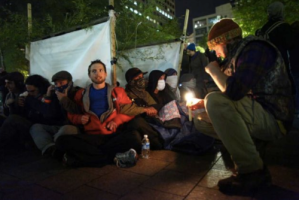by Steven Philp
 The Occupy Wall Street movement is populated by the disaffected and anti-religious left–that is, if you ignore the Jews. A recent article by Mitchell Landsberg of the Los Angeles Times argues that counter to much of American history–where faith communities often stood at the vanguard of progressive causes–this particular movement shows the widening gap “between the religious right and the not-so-religious left.”
The Occupy Wall Street movement is populated by the disaffected and anti-religious left–that is, if you ignore the Jews. A recent article by Mitchell Landsberg of the Los Angeles Times argues that counter to much of American history–where faith communities often stood at the vanguard of progressive causes–this particular movement shows the widening gap “between the religious right and the not-so-religious left.”
Landsberg finds evidence of this in his cursory examination of the Occupy L.A. protest, where the only signs of faith communities are a meditation tent and a sukkah. Yet Landsberg gives those short shrift, pointing instead to the lack of organized Christian involvement. He interviews John Green, director of the Ray C. Bliss Institute of Applied Politics at the University of Akron in Ohio. Green bemoans the dearth of Christian representation. “Where are the mainline Protestants? Where are the Quakers?” Green asks. “There’s been relatively little denominational involvement.”
What Landsberg fails to recognize is the Jewish involvement in the protests that extends beyond a small, temporary structure outside Los Angeles City Hall. Our participation in the movement is organized, pervasive, and–most importantly–inspired by the values of our community. In early October, Jews of all ages came out en masse to participate in the Occupy Wall Street Kol Nidre service. According to an article published by the Huffington Post, several hundred people attended the event in New York, with sister services occurring in other major cities such as Los Angeles, Chicago and Washington, DC. The Wall Street service was sponsored by Jewish organizations such as Jews for Racial and Economic Justice and the Shalom Center; 100 prayer books were donated by the Rabbinical Assembly, the governing body of the American Conservative movement. Daniel Sieradski–one of the event planners–found his inspiration to organize the service from his Jewish values. Paraphrasing Isaiah 58:5–the haftarah (additional reading) for Yom Kippur–Sieradski explains, “You can fast for a day, you cover yourself in ashes, you can wear a sack cloth, but who cares if you are not out there feeding the hungry, housing the homeless, breaking the bonds of oppression?”
Following this event, temporary structures started springing up at protests across the United States as part of a coordinated effort to Occupy Sukkot. Facebook pages were created to arrange for the provision of sukkot, lulavim and other ritual objects necessary for Sukkot observance. Sukkot were raised in cities with large Jewish populations like New York and Los Angeles, and in smaller Jewish enclaves like Seattle and Portland.
The connection between Sukkot and the Occupy Wall Street movement was a natural one. Writing for the Huffington Post, Rabbi Ellen Lippmann of Kolot Chayeinu explains: “For the newly or long-time homeless, the sukkah provides shelter. For those in danger of losing homes, the sukkah is a fragile home that nonetheless stands firm. For those who have lost jobs, the sukkah offers a bountiful table for all, old and young.” For eight days the sukkah became a powerful symbol of the Occupy movement, and of the Jewish resolve to stand on the side of justice in the face of adversity.
In a way, the Occupy Judaism initiative has become a movement within a movement. With a Facebook page, Twitter account, and e-mail lists, it has the ability to rapidly mobilize hundreds of Jews, who share the dissatisfaction of their peers while simultaneously drawing inspiration from the Jewish tradition. Even with the diversity of opinion among Jewish participants, this population belies the characterization of the Occupy protests as a secular movement–rather, the character of Occupy Judaism is the distinctly Jewish mix of the spiritual and cultural. Sieradski explains, “I am less concerned about halakhah–Jewish law–and traditional observance than I am about the prophetic character of recognizing the divine in my fellow human being.”

One thought on “Not So Secular: Jews Occupy Wall Street”
I was unaware about the lack of other religious group organizing together. What percentage of the movement is Jewish, I wonder? I am aware of the anti-semitic feelins, according to my post http://www.alefbet.com/blog/?p=509. Overall, I too hope each person can “recognize the divine in my fellow human being.”